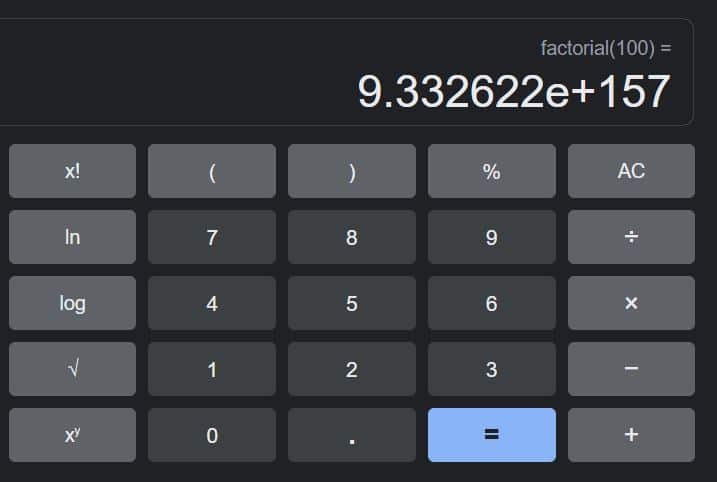Education
What is a Factorial of Hundred?

You may have coined the term “factorial” as a math enthusiast. But what does it mean, and what are some specific examples? In this blog post, we will explore the definition of the factorial and provide some examples of how to calculate it. We’ll also answer the question: What is a factorial of hundred? So if you’re ready to learn about the exciting world of factorials, keep reading.
[lwptoc]
What is factorial?
The product of all the integers from 1 to a quantity is known as the factorial of that number. So, the factorial of 4 would be 1x2x3x4=24. The symbol of the factorial number is n!.
For example,
5!= 5x4x3x2x1=120
7!= 7x6x5x4x3x2x1=5040
As you can see, the factorial of a number can be a large number, even for relatively small numbers.
How to calculate the factorial of a number?
There are two ways that you can calculate the factorial of a number. The first way is simply to multiply all the integers from 1 to that number. So, for our example above, the factorial of 4 would be 1x2x3x4=24.
The second way to calculate the factorial of a number is to use the factorial function. This function is available in most mathematical software programs, such as Microsoft Excel. To use the factorial function, enter the number you want to calculate the factorial for into the function. For our example above, we would enter “4” into the function. The factorial function will then return the answer, which in this case would be 24.
What is a factorial of 100?
Now that we know what a factorial is and how to calculate it let’s answer the question: What is a factorial of a hundred? So, the factorial of 100 would be 100x99x98x97x… all the way down to 1. This is a very large number, too large to fit into this blog post!
The factorial of 100 is so large that it doesn’t even have a name. So, it is called the “100 factorial” or “number 100!.
What is the factorial formula?
You can use a formula to calculate the factorial of a number. For any positive integer n, n!=n(n-1)(n-2)…(2)(1). So, using our example from above, the factorial of 4 would be 4!=4(4-1)(4-2)(4-3)=4x3x2x1=24.
FAQs:
Q: What is the factorial of 0?
A: The factorial of 0 is 1. This may seem like a strange answer, but it is true!
Q: What is the factorial of a negative number?
A: The factorial of a negative number is not defined.
Q: Is the factorial of a number always a whole number?
A: No, the factorial of a number is not always a whole number. For example, the factorial of 1.5 is 1.5×0.5x-0.5=-1.125.
Q: What is the factorial of infinity?
A: The factorial of infinity is not defined.
Q: What is the largest factorial that has been calculated?
A: The largest factorial that has been calculated is the factorial of 10,000, equal to 10,000×9, 999×9, and 998 x… all the way down to 1. It’s just referred to as “10,000 factorial.
Conclusion:
Now you know about the factorial of hundred. Other information that you should know is also present in this article. But, if you have leftover questions, never hesitate to ask them in the comments section below.
Check out: Know About IB Math Tutoring
-

 News3 weeks ago
News3 weeks agoConfessions of a Pole Dancing Priest by The Reverend Laura Chapman, with Warren FitzGerald
-

 Auto4 weeks ago
Auto4 weeks agoNSW Driving Test: Eligibility Criteria, Essential Documents, and More
-

 Fashion4 weeks ago
Fashion4 weeks agoHow To Choose The Perfect Diamond Shape For Your Engagement Ring
-

 Home Improvement4 weeks ago
Home Improvement4 weeks agoGet a Streak-Free Shine with These Tips for Using Spray Window Cleaning












